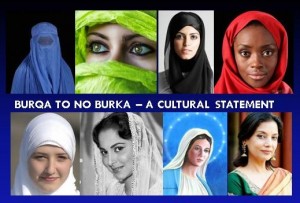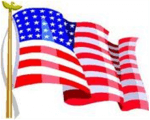Donald Trump speaks the language of the street, and it has its own appeal. He argued in a New Hampshire rally (October 26, 2015) in defense of the wearing of the Burqa, the full-length robe for women covering all but the upper face. “In fact, it is easier; you don’t have to put on make-up.” Indeed, that is one of the most common arguments in favor of the Burqa; women don’t have to spend hours doing their hair or spend time on makeup.
Born and raised in New York, Trump understands diversity. He probably has seen all the cultural expressions of New York’s inhabitants, and seems to have accepted diversity as a part of God’s creation.

The Burqa is a regional and a cultural wear and not a religious garment. But over a period of time, culture and religion in certain parts of the Middle East and Central Asia have blended and become inseparable. Being cultural, it varies from country to country– not all Muslim women wear Burqa; A Muslim woman’s modesty garments vary from a simple scarf to wrap-around scarf to a shuttle-cock covering. Trump is right when he says Burqa “is a matter of individual choice.”
The purpose of Hijab (covering) is twofold; to ensure safety of women through modesty, and to prevent men from staring at the obvious. The Quran says to men; “Lower your gaze” and to women, “Cover your bosoms” and live freely without apprehensions.
Those who are not personally familiar with Muslims may find it difficult to understand that the head covering in America is becoming more of a fashion statement than a religious one. A huge percent of girls wear the Hijab even though their mothers and grandmothers don’t. Minorities seem to have a need for identity. The Orthodox Jews, Sikhs, Hindus, Muslims and all others find different expressions of their identities.
Indeed, attachment to culture is much deeper than religion; culture is a way of life that emulates the practices of families and friends. For example, the marriage rituals of Indian Muslims are heavily influenced by Hindu culture, and nowhere else on the earth, other than the Subcontinent , do Muslim marriages look like Hindu marriages.
American culture is unique; it permeates into every other culture and religion. When an American joins a buffet line for lunch, he or she takes his place in the line and rarely does he or she violates the rule. Whether one is weak or strong, man or a woman, in a hurry or not, the principle of equality prevails. America does it to everyone, thank God for that!
Whether you go to a Jain Temple, Hindu Temple, Gurdwara or a Mosque – men and women sit separately; it is cultural and not a religious thing. When devotional songs or prayers begin, all the women cover their heads with aanchal (an extended garment to cover hair) – very few of them don’t. Indeed, Catholic women also cover their heads and Jewish women do it in their own way, in fact at one time they wore wigs.
Except for a few women from major metropolitan cities, most Indian women from all faiths will not wear mini-skirts when they are here in America; you cannot get them to wear it either and that is their comfort zone.
Muslim women have been wearing different forms of head coverings for centuries. A woman who covers her full face will not take the scarf off when that is her comfort zone.
I took my kids to every place of worship so they could grow up to be accepting of others, and when I went to the Baptist Church I wore casual clothes, and my jeans had a hole on the back pocket, I was comfortable with that, but my wife was not, so the next day my favorite pants disappeared. Culture means conformity with others in a given situation.
Every woman has her own comfort zone and so does every man. Most men from South Asia will not walk around naked in their homes, even if a few may do, and that is their comfort zone. Most Muslim men will not take their shirts off in the presence of female members of the family, nor will they wear shorts in their homes, and that is their comfort zone.
Personally, I am not in favor of the Burqa, but several years ago, my late wife gave me a panic attack. One day, she announced that she will start wearing the Burqa. She had never worn any kind of Hijab other than covering her head during the prayers, which most women do. For a few minutes I was dumbed down; I acted like a snake had bitten me. I had to arrest myself before speaking, as the thoughts raced. “Am I a brute to tell her not to wear? Can I tell her not to wear? Will I go out shopping with her in that Burqa?” It was quite a mental exercise for me, and I am glad I was put to the test and finally said, “Najma, that is your choice”. She was probably testing to see if the man who believes in equality would live up to his words.
Women should not be a game for men – they should have the freedom to wear what gives them comfort. No man should tell her to wear or not to wear the Burqa. It should be her choice.
When we understand true freedom, we will learn to respect the otherness of others and accept the uniqueness of each individual. We all need to grow up and shed our biases towards any one and any culture.
We ought to take the steps to prevent anyone from forcing their values onto others. Remember, most men are civil, and only a few are bad. It has nothing to do with religion, culture, income level and it has all to do with how they were raised or how they were influenced by friends around them.
It is utterly wrong to conclude that Muslim, Sikh, Hindu or Christian men treat their women badly. No, that is not the truth. You will find a similar percentage of men in all groups treating women badly. It has got to go.
What is it to you if a woman wears Burqa or not? What is your gain or loss? Let it be her choice.


- Whats the American Muslim Agenda? - February 12, 2019
- Muslims for America Since July 4, 1776 - June 29, 2017
- Eid Al-Fitr Ramadan Sermons to focus on building a Secure Cohesive America - June 25, 2017





















